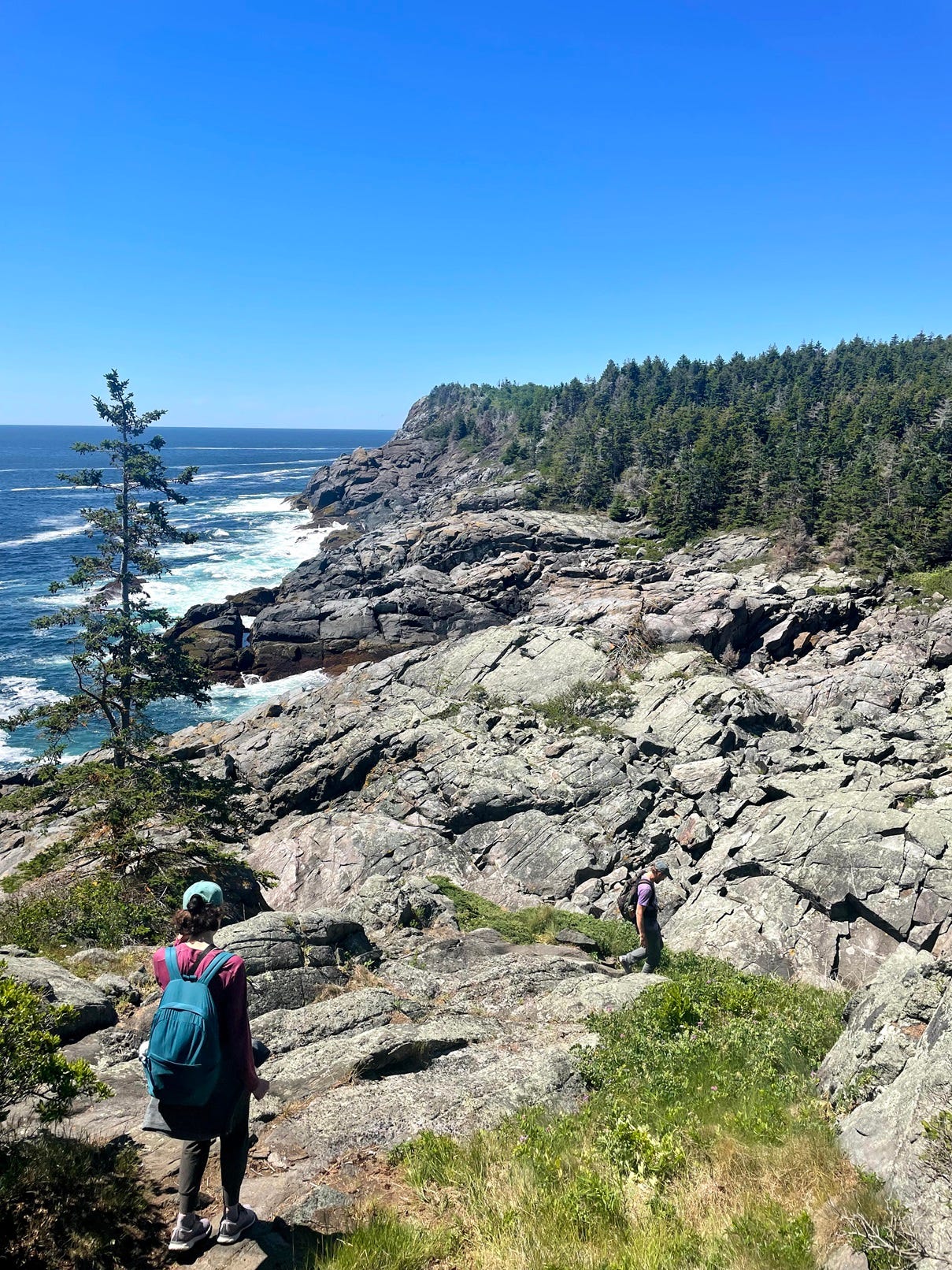Gratitude and Regeneration - redux
11/23/23 – Rebuilding the world by reimagining our role within it.
Hello everyone:
The quote of the week is from Robin Wall Kimmerer, from her long, beautiful essay in Emergence magazine, “The Serviceberry”:
Gratitude is so much more than a polite “thank you.” It is the thread that connects us in a deep relationship, simultaneously physical and spiritual, as our bodies are fed and spirits nourished by the sense of belonging, which is the most vital of foods. Gratitude creates a sense of abundance, the knowing that you have what you need. In that climate of sufficiency, our hunger for more abates and we take only what we need, in respect for the generosity of the giver.
As always, please remember to scroll past the end of the essay to read some curated Anthropocene news.
Now on to this week’s writing:
This week I’m offering a reworked short piece – in which I introduce an excerpt from Regeneration: Ending the Climate Crisis in One Generation – that I put together for Thanksgiving two years ago, when I had just 30 of these Field Guide letters under my belt and far fewer subscribers. Now, two years, several hundred pages, and I-don’t-want-to-know-how-many thousands of words later, the message from the good folks behind the Regeneration project is still deeply relevant to this moment. I think you’ll appreciate it.
Which means I’m sort of taking a break this week. Ostensibly, this is for the holiday, but to be honest it’s because the week has been a heavy one. Heather and I attended the funeral and memorial for Katie, a beautiful, wonderful, compassionate, brilliant young woman who has been the love of my son Harry’s life. We should have been gathering for their wedding, but ovarian cancer claimed her just a few weeks past her 30th birthday.
I could write up a storm about this tragedy, but that’s not what you signed up for. What I’ll say instead, then, is that Katie, who was fiercely loved by everyone who knew her, and who took an accelerated Masters program in social work after her diagnosis so that she could work with children and teens exposed to trauma, had a gift for love, empathy, and gratitude. Much was said at the memorial by those who knew her well about how we could best serve Katie’s memory by being a little more like her: stay connected, love fully, care deeply, work hard, give freely, and have some fun along the way. The gratitude in the gathering for having known Katie was as palpable as the grief for having lost her.
So, in the spirit of gratitude that’s also meant to inspire this holiday season, I first want to thank all of you for joining with me here at the Field Guide, and for sticking with me through these past two and a half years and 136 essays. The Field Guide reading is often heavy, I know, so I’m always grateful for (and a little surprised at) your attention and support. I’m grateful for the kindness, civility, and thoughtfulness in your comments on the writing, and I’m grateful for the opportunity to keep doing this work.
I’m always working to figure out the balance between describing our new, difficult Anthropocene reality and reminding you of the context in which it occurs: this astonishingly beautiful, lush world that continues to nurture us even as we’ve neglected to nurture it. In this world, too, are millions of good people generating solutions for the path forward, and billions looking to walk that path.
I’m borrowing a brief message of hope and motivation that I’m grateful for, courtesy of Regeneration, by Paul Hawken and his colleagues. The Regeneration book and website offer a remarkable collection of solutions in short (2 to 4 page) illustrated essays that are intelligent, in-depth, and as philosophical as they are pragmatic. What they offer is a plan to redirect the daily life of civilization toward restoring the health of the human community and the community of life.
There’s a wonderful education to be found in their writing, which is ethical without being dogmatic and sophisticated without relying on jargon. I highly recommend that you devote yourself either to reading the book or perusing the website.
What I appreciate most about Regeneration is that the authors a) recognize the climate crisis as part of the larger set of changes we’re making to life on Earth, and b) understand it to be as much about the living world as it is about greenhouse gas emissions. Regeneration, as you’ll read here, is about restoring the fabric of life and improving people’s lives around the globe as we simultaneously draw down emissions. In fact, many of the best solutions we have for stabilizing the climate are also solutions for enriching human life and biodiversity.
What I’m quoting here is the first of two brief introductory essays in Regeneration. This one, also titled “Regeneration,” is an explanation of what regeneration is and why it’s essential in a wounded world. The second, entitled “Agency,” does a fine job of explaining that yes, each of us does have the power to do what needs to be done. I wrote about that in an essay also titled, cleverly enough, “Agency.”
Here is Paul Hawken and company, from page 9 in Regeneration:
“Regeneration means putting life at the center of every action and decision. It applies to all of creation – grasslands, farms, people, forest, fish, wetlands, coastlands, and oceans – and it applies equally to families, communities, cities, schools, religions, cultures, commerce, and governments. Nature and humanity are composed of exquisitely complex networks of relationships, without which forests, lands, oceans, peoples, countries, and cultures perish.
Our planet and youth are telling us the same story. Vital connections have been severed between human beings and nature; with nature itself; and between people, religions, governments, and commerce. This disconnection is the origin of the climate crisis, it is the very root – and it is where we discover solutions and actions that can engage all people, regardless of income, race, gender, or belief. We live on a dying planet – a phrase that may have sounded inflated or over the top not long ago. The earth’s biological decline is how it adapts to what we are doing. Nature never makes a mistake. We do. The Earth will come back to life no matter what. Nations, people, and cultures may not. If putting the future of life at the heart of everything we do is not central to our purpose and destiny, why are we here?
The proximate causes of the climate crisis are cars, buildings, wars, deforestation, poverty, oil, corruption, coal, industrial agriculture, overconsumption, and fracking, among others. All have the same origin and impact: the economic structures created to support human well-being degenerate life on earth, creating loss, suffering, and a heating planet. The financial system is abetting and investing in planetary liquidation – a short-term source of monetary wealth and a near-term cause of biological depletion, poverty, and inequality.
For the past forty years, the most powerful way to reverse global warming was largely overlooked. Fossil-fuel combustion is the primary cause of warming and must cease rapidly; without this, there is no cure. However, in order to stabilize the climate, we need to draw down carbon dioxide and bring it back home. The only effective and timely way to reverse the climate crisis is the regeneration of life in all its manifestations, human and biological. It is also the most compelling, prosperous, and inclusive way. Biological degeneration has brought us to the brink of an unimaginable crisis. To reverse global warming, we need to reverse global degeneration.
Our economic systems, investments, and policies can bring about the degeneration of the world or its regeneration. We are either stealing the future or healing the future. One description of the current economic system is extractive. We take, we dam, we enslave, we exploit, we frack, we drill, we poison, we burn, we cut, we kill. The economy exploits people and the environment. The ongoing cause of degeneration is inattention, apathy, greed, and ignorance. Climate change may leave people feeling as if they have to make a choice between “saving the planet” and their own happiness, well-being, and prosperity. Not at all. Regeneration is not only about bringing the world back to life; it is about bringing each of us back to life. It has meaning and scope; it expresses faith and kindness; it involves imagination and creativity. It is inclusive, engaging, and generous. And everyone can do it. It restores forests, lands, farms, and oceans. It transforms cities, builds green affordable housing, reverses soil erosion, rejuvenates degraded lands, and powers rural communities. Planetary regeneration creates livelihoods – occupations that bring life to people and people to life, work that links us to one another’s well-being. It offers a path out of poverty that provides people with meaning, worthy involvement with their community, a living wage, and a future of dignity and respect.
In December of 2020, Dr. Joeri Rogelj of the Grantham Institute in London and a lead author of the Sixth Assessment of the Intergovernmental Panel on Climate Change made a remarkable statement: “It is our best understanding that, if we bring carbon dioxide [emissions] down to net zero, the warming will level off. The climate will stabilize within a decade or two. There will be very little to no additional warming. Our best estimate is zero.” This was a remarkable change in scientific consensus. For decades it was assumed that if we were able to stop our carbon emissions, the momentum of warming would continue for centuries. That was mistaken. Climate science now indicates that global warming would begin to recede after we achieve zero carbon emissions.
This is a watershed moment in history. The heating planet is our commons. It holds us all. To address and reverse the climate crisis requires connection and reciprocity. It calls for moving out of our comfort zones to find a depth of courage we may never have known. It doesn’t mean being right in a way that makes others wrong; it means listening intently and respectfully, stitching together the broken strands that separate us from life and one another. It means neither hope nor despair; it is action that is courageous and fearless. We have created an astonishing moment of truth. The climate crisis is not a science problem. It is a human problem. The ultimate power to change the world does not reside in technologies. It relies on reverence, respect, and compassion – for ourselves, for all people, and for all life. This is regeneration.”
Other than the curated Anthropocene news below, that’s it for this week, folks. Be well, relax, and if possible find some peace in the “thanks” and the “giving” that name this peculiar American “holy day.” Remember amid the Thanksgiving mythology that most of the best-managed biodiverse land on Earth is Indigenous land, and that the land you live on – whether urban or rural – was once green, diverse, healthy land as well.
As we look ahead to the regeneration work that must be done, we should remember that it starts with a realignment of our values, whether personal, economic, or national. With that in mind, here are a few closing thoughts:
Our community includes the community of life.
Economies are entirely dependent on ecology.
Healthy places make healthy people.
Democracy is more important than patriotism.
Work that restores and respects life restores our self-respect.
The improvement of the well-being of the world improves our own well-being.
The world does not belong to us; we belong to the world.
I’ll close by repeating a question from the Regeneration text above: “If putting the future of life at the heart of everything we do is not central to our purpose and destiny, why are we here?”
I think Katie would agree.
Thanks for sticking with me.
In other Anthropocene news:
From Bill McKibben’s newsletter The Crucial Years – which is very much worth your subscription – there’s a huge push on among young activists on TikTok (and older ones with pen and paper) to stop the proposed massive build-out of LNG plants on the Gulf Coast. The climate consequences of these LNG project would dwarf the huge Willow project in Alaska that the Biden administration recently (and mistakenly) approved. If Biden and the Dept. of Energy cancel these LNG projects, they can earn some points back with young voters, take a good step toward a survivable future, decrease fracked gas prices here in the U.S., and offer a dose of sanity in a world that the fossil fuel companies are looking to drive crazy.
An investigation by the Guardian, Oxfam, and the Stockholm Environment Institute found that the richest 1% (the 77 million people making more than $140K per year, including millionaires and billionaires) are responsible for more climate-heating emissions than the poorest 66% of humanity. Oxfam is calling for major increases in taxes on extreme wealth:
Oxfam International’s interim executive director, Amitabh Behar, said: “Not taxing wealth allows the richest to rob from us, ruin our planet and renege on democracy. Taxing extreme wealth transforms our chances to tackle both inequality and the climate crisis. These are trillions of dollars at stake to invest in dynamic 21st-century green governments, but also to re-inject into our democracies.”
From Canary Media, a good-news story about Portugal reaching a tipping point with renewable energy, powering the entire country of 10 million for nearly a week with nothing but wind, solar, and hydro.
Also from Canary Media, the Biden administration is releasing 41 million dollars to train new clean energy workers. The funds will “help create 27 new centers to train people in energy efficiency, decarbonization and clean energy manufacturing.”
From Grist, a new study shows that controlled burns reduce the risk of high-intensity wildfires by nearly two-thirds, and that the protection can last for years. Anthropocene also covered this study and paired it with another that examined the political barriers that are still keeping forest managers from doing the controlled burns that we all know we need.
From Renewable Revolution here on Substack, “The Eight Deadly Sins of Analyzing the Energy Transition,” a wonky but important read on how most assessments of the pace of the switch to renewables are far too conservative. The authors, both from the renowned Rocky Mountain Institute, say that we’re reaching important tipping points already, but that “eight general errors of perspective are holding back understanding, wasting time and capital, and fueling unproductive climate pessimism.”
From Wired, a recommendation that you (and everyone else) should get a heat pump, and great news from the Biden administration on funding to boost domestic production of heat pumps for both commercial and domestic use. The administration has invoked the Defense Production Act, “a provision that allows the president to spur the manufacture of materials needed for national defense.” In this case, the national emergency is climate change.
From Knowable, an excellent primer on the fate of Antarctic ice and the work being done to understand it. In an interview with the great Antarctic glaciologist Richard Alley, who has been studying polar ice for 35 years, he does a really nice job explaining what’s happening and what’s at stake.
From NPR, an update to the USDA Plant Hardiness Zone Map that shows half the country has become half a zone warmer than it was just a decade ago. This means that for those areas, it’s possible to grow more plants that previously could only survive farther to the south. But it also means that some areas in the southern U.S. may now be too hot for some plants, as a woman in Florida points out:
"The sweet little grannies here are just heartbroken, they can't grow their tomatoes," she says, "It's so much hotter, the tomatoes burn."
From the Guardian, the strange cautionary tale of a legion of Dutch farmers responding angrily to the government’s ill-advised but necessary plan to cut back hard on nitrogen pollution. The revolt has upended Dutch politics and encouraged conservative activists around the world.
From Hannah Ritchie at Sustainability by Numbers, a great concise assessment of the amount of waste we should expect from the rapid expansion of wind and solar energy systems. The answer is not very much, especially compared to the waste from coal production, plastic production, and regular waste streams. Well worth reading to ease whatever concerns you might have on this topic.







Dear Jason,
May you and your family find solace on the other side of your immeasurable loss.
Sending unconditional love and healing thoughts.✨
Jason- I am so sorry for your loss. As one of your many dedicated readers, I feel honored that you chose to share so openly about your grief with us. Wishing you peace, Laura